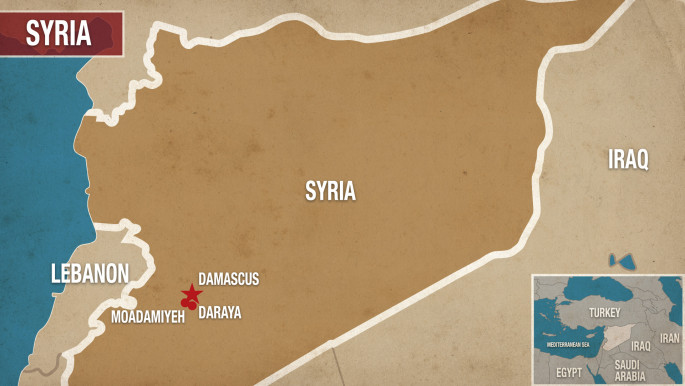Syria aid groups call for investigation into UN-Assad relationship
The decision comes after reports that President Bashar al-Assad had influenced the distribution of aid and relief efforts inside Syria.
A coalition of aid groups - including the Syrian American Medical Association and the Syrian Civil Defense or "White Helmets" - delivered a letter to the UN Office for the Coordination of Humanitarian Affairs (OCHA) on Thursday afternoon in Gaziantep, southern Turkey.
The letter stated that the 73 groups who signed the letter were no longer able to tolerate the "manipulation of humanitarian relief efforts by the political interests of the Syrian government that deprives other Syrians in besieged areas from the services of those programmes".
Ethnic cleansing
The development comes after more than 300 residents left the besieged Damascus suburb of Moadamiyeh last Friday, relocating to the nearby regime-controlled town of Horjelah.
It was part of a deal that would give the regime control over the area, which has been in opposition hands and been under a siege for three years.
Less than two weeks earlier a similar agreement saw rebels and residents displaced from the neighbouring district of Daraya.
The suburb had seen one of the longest sieges in the Syrian war, with locals having the choice of relocating to rebel-held Idlib province or submitting to regime control. Most chose to leave.
Speaking to The New Arab, Elise Baker, a research coordinator for a New York-based humanitarian group for medical professionals, Physicians for Human Rights (PHR), said that civilians in besieged opposition areas have suffered huge privations during the years of blockade.
"The agreements over Daraya and Moadamiyeh are devastating. The populations of these areas have suffered five years of conflict and have been under siege for years, the agreement means they saw no hope," said Baker.
"It is totally gut wrenching, this was their only escape they have been totally abandoned by the international community."
The humanitarian group has also been investigating attacks on healthcare facilities and personnel, and looking into cases where civilian populations have been denied access to medical care for up to four years.
After hundreds of civilians in Moadimiyeh were evacuated in February, and re-housed in nearby regime-controlled districts, the PHR described the agreement as a "war crime", and said that the population transfer was carried out under duress.
"The Syrian government gave the people of Moadamiyeh two choices: either surrender or starve," said Widney Brown, PHR director of programmes in February.
Stolen supplies
While humanitarian supplies have intermittently been allowed to enter Moadimiyeh following UN brokered deals, the medical human rights group claim that convoys reaching the besieged area have been routinely searched by regime troops, and stripped of vital medical equipment including ventilators, surgical supplies, and midwife kits.
The area was also subjected to a sarin gas attack in June 2013, and been heavily bombarded by pro-regime forces.
 |
"You have Moadamiyeh and Daraya, but this is only the tip of the iceberg." Elizabeth Baker, Researcher at Physicians for Human Rights |
 |
"The Syrian government are guilty of numerous war crimes in their approach to neighbourhoods such as Daraya and Moadamiyeh, sieges against civilians are war crimes, depriving civilians from access to food, water, medicine. The goal is to force people to surrender," said Baker. "It is also a form of collective punishment for areas perceived to have supported the opposition."
Baker further pointed out that the options presented to inhabitants of Daraya during its evacuation constituted offered little recourse for the civilians.
 |
|
| Click to enlarge |
"They were given a form of choice – go to (rebel controlled) Idlib where they are likely to face aerial bombardment (from Syrian and Russian warplanes) or go to pro-government areas in Damascus. They see both as risks because they lack faith in the government."
Baker added that whilst the UN faced an uphill struggle in Syria to ensure humanitarian aid reached those in need, the regime had been given undue "power to determine the amount of aid that is distributed and where it goes".
Given such realities, Baker said the decision by over 70 aid organisations to suspend cooperation with the UN was understandable.
"We understand the frustration these Syrian NGOs are facing with the UN. The UN has allowed the Syrian government to manipulate aid deliveries for the past five years, resulting in death and suffering," Baker said.
She pointed out that while sieges in Aleppo, Daraya and Moadamiyeh had garnered media attention, groups such as PAX and The Syria Institute concluded that an over 1 million people inside Syria were estimated to be living under siege.
"You have Moadamiyeh and Daraya, but this is only the tip of the iceberg."



